Your glass really can become half full: The documentary that shows how you can train your brain to become an OPTIMIST in seven weeks
- - Michael Mosley has investigated the science of personality and discovered that our
- outlook on life is not fixed and unchangeable
- - By regularly practicing two mental exercises - mindfulness and cognitive-bias
- modification and with no drugs or therapy he felt happier
- - Cutting edge tests showed that within just seven weeks his brain activity became
- less characteristic of a pessimistic and anxious person
- - Study has shown that on average, being optimistic can add more than seven years
- to a life - four years more than if a cure for cancer was found
|
Do you see the glass half full or half empty? If you answered the latter, you probably think your bleak outlook is irreversible and you are destined to be pessimistic for the rest of your life.
But, according to latest scientific research, this simply isn't true.
A new BBC documentary featuring Michael Mosley has investigated the science of personality and discovered that in just seven weeks it is possible - without drugs or expensive therapy - to become more optimistic and less anxious.
Are you an optimist or a pessimist? Scroll down for the expert test

Michael Mosley has his brain activity monitored at Essex University before he embarks on two 'treatments' for pessimism. Results reveal that the right side of his brain is far more active than the left, a trait associated with anxious and neurotic people
It found that while the personality is a complex interaction of genes, environment and life events, it is not set in stone and can change - even on a genetic level.
At the beginning of the programme Dr Mosley said: 'I have a tendency to be a catastrophic thinker - that I will one day get a disease or end up with no money.
'I'm a bit of a pessimist and fret about the future even though the likelihood of all these things happening is almost zero.'
Dr Mosley, who has suffered with chronic insomnia for the past 20 years, explained he wanted to become a 'warmer, happier person and to sleep better.'
On his quest to optimism he had his brain tested at Essex University by Professor Elaine Fox, a leading expert on the science of optimism.

Research has shown that with certain mental exercises you can learn to see that the glass of life is half full
Previous research has shown that those who have a tendency to worry or be neurotic suffer with 'cerebral asymmetry', where the right side of the brain is far more active than the left side. Why this is, is yet to be discovered however.
The results confirmed the reality of Michael's outlook. By analysing electrical activity, experts showed him that the right side of his brain was three times more active then the left when in its resting state.
There is an increasing body of research that shows quite how much a person's outlook impacts on their mental and physical health.
A 40-year Yale study following the over-50s in Oxford, a town in Ohio, has clearly shown that those who believe that aging is a negative thing - something that equates to pessimism - live on average seven and a half years less.
To put this in context, Michael explained that if a cure for cancer was found tomorrow, it would, on average, add jut half that to a person's life.
In the programme Michael embarked on two 'treatments' for his chronic anxiety and pessimism: cognitive-bias modification (CBM) and mindfulness.
For him, CBM involves using a type of brain training game which requires watching a computer screen full of faces pulling difference facial expressions.
For each 'level' of the game, he must identify sole happy face and click on it. By regularly doing this, it is believed that the brain learns to better tune into positive thoughts.
Dr Mosley is sceptical, but agrees to play the game daily for the next seven weeks.
Secondly, he tried mindfulness. He met an ex-monk who explained what the ancient art of mindfulness is and said that everyone could benefit from taking 10 to 20 minutes out each day to cut off from the outside world and 'live in the moment'.
Mindfulness is a form of meditation that focuses a person's awareness and attention but maintains a sense of calmness and relaxation.
MINDFULNESS: HOW TO THINK YOURSELF POSITIVE
Mindfulness, a form or meditation, is an ancient practice that involves focussing a person's awareness and attention but at the same time maintaining a sense of calmness and relaxation.
Try working this exercise into your routine each day for 10 minutes and slowly build up to 20 if you want to try and change your mindset.
- Before directing your mind towards the anxiety or negative thought you are experiencing, focus on your breathing – the sensation of air slowly flowing into your nostrils, streaming down the back of your throat and into your lungs.
- Feel the beating of your heart and imagine how it pumps oxygenated blood around your body. Continue until you’re ready to meditate.
- Now, shift your attention to your anxious thoughts. What thoughts are present in your mind right now? Are there many moving quickly or does each one remain for a while? Consider the thoughts objectively rather than reacting to them emotionally.
- There’s a myth that when you meditate, you should have a blank mind. But thoughts are not the enemy and trying to stop them will only lead to more struggle.
- Treat the thoughts during meditation like having a radio on in the background – you can hear it, but your main focus is elsewhere. In mindfulness, you’re paying attention to the fact that you have a thought but you are not buying into what it is saying.
- Try not to judge the thought as ‘good’ or ‘bad’. Cultivate an attitude of equanimity to whatever goes through your mind. Watch your thoughts with curiosity and kindness and they will become easier to bear.
- Whenever you notice your mind is wandering, acknowledge that it has meandered and gently bring your attention back to observing your thoughts.
- Continue working with your worries in this way for the period of time you have chosen. Working mindfully can be challenging, so it’s good to practise for short periods at first.
- You may feel dizzy when you start but that’s because you’ve suddenly stopped spinning around in circles. In the stillness of meditation, it can also seem as if you have more thoughts than usual but this is not so: it is just that you are becoming more aware of them. The more you practise, the more your mind can deal with worries in a less panicked way.
- The Mindful Manifesto, by Dr Jonty Heaversedge and Ed Halliwell, Hay House, £10.99
The psychological technique involves sitting still, usually closing the eyes, and becoming aware of the sensations you feel in your body without judging them.
Eventually a person learns to let their thoughts come and go freely without ruminating on them. In many cases this leads a to calmer - and less pessimistic - person.
A restless Mosley admitted he found it difficult to carry out such a seemingly easy task but he gradually learns to enjoy the time he takes out of each day to simply relax.
Over the following weeks he build up from 10 minutes a day to 20 minutes.
At the end of the seven weeks he asks his long-suffering wife if he has become anymore relaxed or positive and she says that she can see a distinct difference.
She said he has dealt with the stress of filming better and he admits he has slept the best he has in years.

Michael Mosley visit a brain bank containing the brains of 3000 humans. Experts hope that by analysing the organs, they will be able to better understand the way people think
Although the anecdotal evidence is heartening, Michael returns to Essex University for hard evidence of any brain changes.
The results are astonishing. After just seven weeks the 'asymmetrical' levels of brain activity had become more equalised, a strong indicator that he had become more optimistic.
In addition to this, his scores when reacting to the CBM brain training game had changed too. He reacted far faster to happier faces and much more slowly to sad faces than before.
This indicated that he was no longer seeking out negativity as much and in turn has become more naturally upbeat.
Dr Mosley ends the programme by saying he feels elated by his results. He said: 'I feel quite frankly astonished that you can notice that much change in just seven weeks.
'I set out to see if it was possible to change my mind and I think I might have done it. I am absolutely thrilled.'


No comments:
Post a Comment